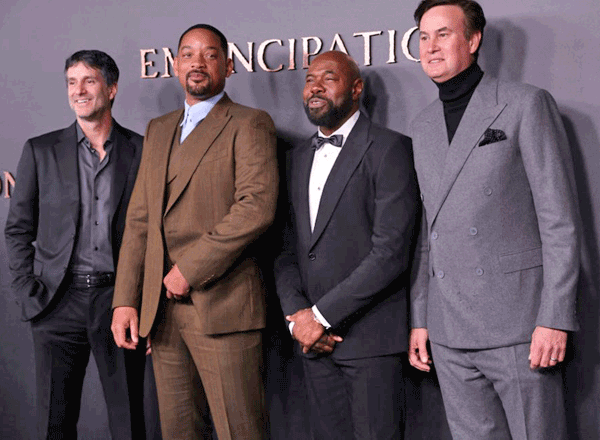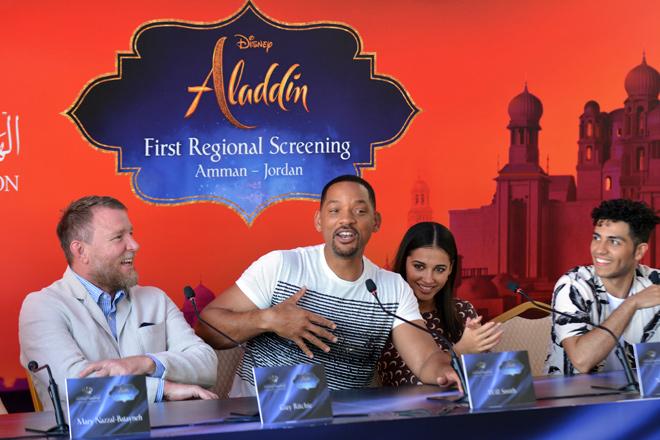You are here
Fuqua juggles Will Smith comeback and slavery politics in ‘Emancipation’
By AFP - Dec 03,2022 - Last updated at Dec 03,2022

Left to right: Apple co-head of programming Jamie Erlicht, US actor Will Smith, US director Antoine Fuqua and Apple co-head of programming Zack Van Amburg pose upon arrival for the European premiere of ‘Emancipation’ at the Vue West End in London on Friday (AFP photo by Isabel Infantes)
LOS ANGELES — Directing “Emancipation”, a brutal and harrowing film about slavery set deep in the alligator-infested Louisiana swamps, was always going to be a challenge for Antoine Fuqua — and then his star Will Smith slapped Chris Rock at the Oscars.
Despite reports that Apple could delay its release until the raging controversy around Smith’s actions subsides, the movie hits theatres this weekend and streams globally next Friday, raising fears that audiences and Oscars voters could boycott it.
“Absolutely, I have big concerns about that,” Fuqua told AFP.
But “Will’s been a good guy, in front of all of us, for 37 years,” he said of Smith, who rose to fame in the 1990s.
“I hope we have more compassion in our hearts, to at least go see the work he did — because he did amazing work in the movie. They all did.”
“Emancipation” is inspired by the story of a Black man who defied enormous odds to escape slavery during the United States’ Civil War.
“Whipped Peter” became a global symbol of the horrors of slavery, after photographs of his bare back — utterly mutilated by lashings he received on a cotton plantation — circulated around the world.
Less is known about the real man, who Smith depicts fleeing sadistic slavers and evading alligators, snakes and other perils in the Deep South swamps, in pursuit of freedom for him and his family.
Paced more like an escape thriller than a sombre historical drama, “Emancipation” is as graphic in showing the savagery inflicted on the enslaved as recent films like “12 Years a Slave”.
The movie was shot on location in real Louisiana swamps, in what Smith at Wednesday’s world premiere in Los Angeles called “an absolute monster of a difficult film to make”.
But while Smith’s performance has drawn praise, critics have pondered whether it is too soon for a comeback, just eight months after the notorious Oscars night.
Smith resigned from the Academy for striking Rock on stage over a quip about his wife’s hair loss. He has been banned from attending the Oscars for a decade, though can still win Academy Awards.
An image rehabilitation campaign has included online apologies and a late-night TV show appearance in which Smith told host Trevor Noah that he “was going through something that night” and had “just lost it”.
On “the question of the slap”, Fuqua is unequivocal that “it was wrong.”
But the “Training Day” director added: “Will’s a good guy. I stand behind him.
“I was with him for a couple years, man, I’ve been in the swamps with him. The guy never complained once.”
‘Scary’
For Fuqua, part of the urgency for releasing the film now is a US political climate in which the legacy of slavery has become a hot-button, polarised issue.
“You hear about things in America especially where there’s discussion of not teaching about slavery in some of the schools... like they want to erase the past,” he said.
Republicans have slammed proposed education reforms that would address systemic racism and the legacy of American slavery in schools.
Mitch McConnell and other conservative senators wrote last year that children should not be “taught that our country is inherently evil”.
But Fuqua said there are “scary” parallels with the “Whipped Peter” photographs, which were required to finally confront many who had sought to downplay the brutality of slavery back in 1863.
“That’s why it’s important to keep the museums going, to keep alive all these things,” he said.
“A lot of kids don’t even know about slavery.”
Whether the film’s message is lost in the chatter surrounding Smith and Rock remains to be seen.
But Fuqua remains hopeful that the two men can reach a respectful reconciliation of their own.
“Hopefully they can get together, not in front of cameras, and shake hands and have forgiveness and move on with their lives,” he said.
“I just keep my focus on the film,” said Fuqua.
Related Articles
LOS ANGELES — Less than a year after Will Smith shocked millions around the world by slapping Chris Rock at the Oscars, his new film “Emanci
AMMAN — Hollywood heavyweight Will Smith said on Monday his son Jaden inspired him to take the role of the genie in a remake of Disney class
AMMAN — Just as he walked into Wadi Rum, actor Will Smith envisioned how to infuse his awe-inspiring experience into the character he is pla


















